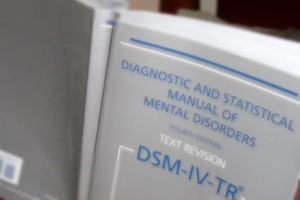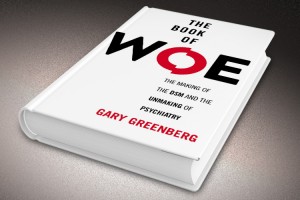The Sydney Morning Herald – August 29, 2013
By Sam de Brito
Last month I wrote about the subject of cognitive behavioural therapy (CBT) and the philosophy of the Stoics, both of which may be incompletely summed up by the saying “nothing is either good or bad, but thinking makes it so”.
Ever keen to challenge my own assumptions, I came across a fascinating article that argued against this mode of thinking, an interview by Guernica magazine’s Katherine Rowland with psychotherapist Gary Greenberg.
Greenberg, who is also a contributor to The New Yorker, is the author of 2010’s Manufacturing Depression and this year’s The Book of Woe, The DSM and the Unmaking of Psychiatry.
The DSM, of course, is The Diagnostic and Statistical Manual of Mental Disorders of the American Psychiatric Association, described by Greenberg as being as important to shrinks “as the Constitution is to US government or the Bible is to Christians”.
Writes Rowland: “According to Greenberg … The DSM is not a medically or scientifically valid text, but rather a ‘strange chimerical document’ whose definitions of pathology change with shifting social values – as was evidenced by homosexuality’s overlong tenure on its pages.
“Greenberg is certainly not the first to call attention to the social nature of disease, either in terms of origins or medical interpretations. But he may be among the first to get The DSM‘s former editor, Allen Frances, on the record as saying, ‘there is no definition of a mental disorder. It’s bullshit’.”
That’s a pretty startling admission from a man who oversaw “the Bible” of psychiatry, but Greenberg argues this characterisation is especially pertinent when referencing depression and anxiety, which affects three million Australians, according to Beyond Blue.
“People come to think of their unhappiness as a disease, rather than as a result of the material conditions of their world,” says Greenberg who sees much depression as a normal, if not healthy, response to living in an insane world.
Greenberg says The DSM is both “unpopular” and “held in universal contempt” by mental health professionals, but this doesn’t mean it’s not vastly influential in the way mental disorders are diagnosed, saying “you can have the importance and the authority without the faith”.
He criticises the “fictive placeholders” in The DSM that attempt to describe different types of human suffering, yet also admits they fulfill a very human yearning to name things.
“We’re hungry for myth, and as impoverished and deracinated and downright uninteresting a mythology as it is, The DSM is a mythology,” Greenberg says.
“It provides a framework for understanding mental suffering. Myth is a kind of knowledge that helps people negotiate the world, and the particular kind of myth-making that The DSM is engaged with is one of the oldest forms of myth-making in western civilisation, which is naming things.
“Go back to Genesis: God tells Adam to name the plants and the animals. This is a very primordial way of attempting to know the world, to name and to distinguish among the phenomena with which we’re presented. What that really means is that when you name something you are in some way claiming to know it,” Greenberg says.
The problem with naming such a “widespread and amorphous” condition as depression a “mental disorder” is that once someone has been “diagnosed”, it often becomes their identity and takes on a life of its own, even when an individual is reacting quite naturally to stress, financial problems, loss of a loved one, or just simple confusion about a complex world.
“There is no way to draw the line between mental health and mental illness, and to do so has always been more about ass-covering than anything else,” Greenberg says.
“If you could come up with that definition then you could have valid mental illness. You would be able to say this set of symptoms is a disease because it meets the criteria for the disease.”
Of course, once you have a disease or “disorder”, then drug companies and doctors – specifically psychiatrists and psychologists – can charge you to “cure” it or at least pretend they know what’s going on, when often they do not.
Read the rest of the article here http://www.smh.com.au/executive-style/culture/blogs/all-men-are-liars/pathologising-unhappiness-20130727-2qqsa.html




SHARE YOUR STORY/COMMENT